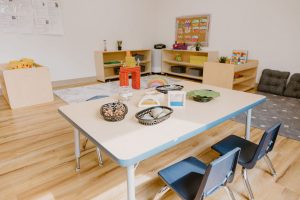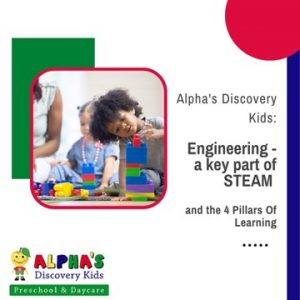Engineering in the Early Years
Four Pillars Of Learning – Pillar #2 – STEAM (Engineering edition)
by Susie Beghin, RECE, Founder of Alpha’s Discovery Kids
My mission has always been to provide children with the best possible start in life and help them develop the critical skills they need to thrive.
When I began writing my book, ‘Learn To Play,’ my primary goal was to use the experiences and knowledge I have gained as an ECE educator and mother. It was also a way for me to document our daycare curriculum and make it accessible to parents everywhere!
The Four Pillars of Learning is a comprehensive program that addresses a child’s physical, cognitive, social, emotional, and spiritual well-being. It comprises Language & Literacy, STEAM (Science, Technology, Engineering, Art, and Math), Physical Activity & Nutrition, and Mindful Awareness.
At Alpha’s Discovery Kids, these pillars are prominently displayed in every classroom across our three locations, and our goal is to ensure children have access to a well-rounded education while learning in a meaningful (and fun) way.

Pillar 2 – STEAM – E is for Engineering
One of the pivotal parts of STEAM is engineering, but when people hear the term ‘engineering,’ they often think it’s something that young children cannot do. However, I use the term intentionally because engineering is precisely what these children do. “Engineering is the process by which young children discover how things in their world are built, and how they work”.
One of the ways we teach engineering in our classrooms is through dedicated and specific areas for construction and building activities. In my last blog, we detailed the integral part that loose parts play in children using their creativity and imagination while learning.
And alongside loose parts, we incorporate materials such as blocks, which hold a special place in my heart. The reason I love blocks is that they are open-ended and allow children to create anything they desire, promoting imagination and creativity. In engineering in our classrooms, we have and use blocks of all sizes, which encourage stacking, sorting, connecting, and disconnecting.
When children engage in engineering activities, they often gravitate towards building tall towers. There is a sense of accomplishment in constructing something tall, even if it only lasts for a few seconds before being knocked down. Both the act of building and knocking down are significant learning experiences, as it allows children to explore concepts of balance, size, and structure as they figure out how to make their towers taller and more stable.

In engineering, we also shift our focus from the end product to the process itself. Instead of dictating what children should create, we provide them with materials and let them decide how to use them. The learning lies not in making a specific object but in gaining insights into size, balance, and cooperation. Engineering becomes a cooperative activity where children work together, negotiate, and problem-solve as they construct and interact with their creations.
The construction area of our classrooms also serves as a hub for social skill development. Children learn to collaborate with their peers, navigate conflicts, and share ideas. They face situations where they need to communicate their preferences and make decisions collectively. It’s an environment that fosters cooperation and encourages children to develop essential social and emotional skills.
The construction area is often our classrooms’ most popular and well-utilized space. Children are drawn to the joy of building and creating. It is a place where their imaginations come alive, they have the freedom to experiment, and they can engage in hands-on learning experiences. As a result, we allocate significant space to this area, recognizing its importance in promoting exploration, creativity, and problem-solving.
Through our focus on engineering, we strive to instill a sense of wonder and curiosity in children. We want them to understand that the process of building and creating is just as valuable as the end result. By embracing engineering in early childhood education, we provide children with opportunities to develop critical thinking skills, expand their imaginations, and foster cooperative relationships.
At Alpha’s Discovery Kids, we are committed to cultivating a love for learning and empowering children to become lifelong learners. Our Four Pillars of Learning, including the exploration of engineering through STEAM, form the foundation of our curriculum. Through these pillars, we create an environment where children can grow, explore, and discover their talents.
For more information on our 4 Pillars of Learning, or to book a tour, please contact us at https://www.alphasdiscoveryclub.com/contact/ or call us at 905-823-8257.

